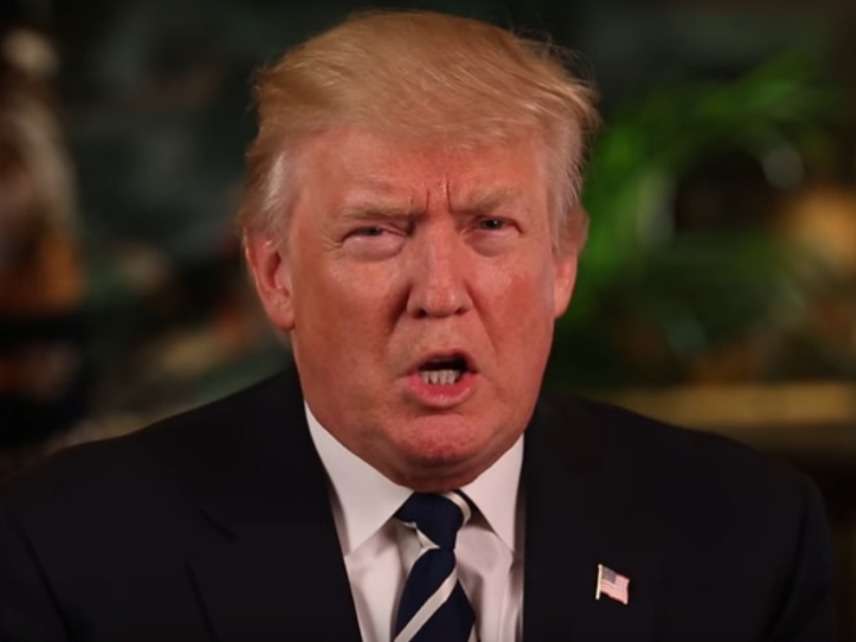Trump Is Right: 'Collusion' Is Not a Crime
It remains unclear whether contacts between the Trump campaign and Russian operatives violated the law.

Yesterday, after The New York Times published a list of questions that Robert Mueller wants Donald Trump to answer, the president complained that the special counsel is investigating a "made up, phony crime, Collusion." That tweet was a notable departure from Trump's usual defense, which consists of asserting, over and over again, that there was "no collusion" between his presidential campaign and Russians trying to influence the 2016 election. But unlike other things Trump said yesterday about the Russia investigation (e.g., that Mueller "had no questions on Collusion" and that obstruction of justice can't occur without an underlying crime), it happens to be true that collusion per se is not a crime. It's a point that Trump's opponents frequently seem to forget.
Most of Mueller's questions appear to be aimed at illuminating Trump's state of mind when he took actions, such as firing the FBI director or castigating the attorney general, that could be construed as obstruction of justice. Contrary to what Trump seems to think, interfering with an investigation of "a crime that never happened" can constitute obstruction. But it is a matter of dispute whether the president can be guilty of obstruction when he does things (such as firing the FBI director or castigating the attorney general) that he clearly has the authority to do. Mueller seems to be operating under the assumption that such actions can amount to obstruction, depending on the motive for them.
Lying to federal investigators, by contrast, would be a clear violation of the law, which is why Trump's former lawyer, John Dowd, was so keen to prevent him from sitting down for an interview with Mueller. As Ken White noted before Dowd quit in disgust, his advice was sound, especially given Trump's penchant for prevarication. Even a fundamentally honest person could easily be tripped up by an imperfect memory, imprecise phrasing, or contradictions between his own recollections and those of other people Mueller has interviewed. And as with obstruction, it does not matter whether the misrepresentations are a cover for actual crimes.
There are several ways in which contacts between Trump's people and Russian operatives could have broken the law, but they all go beyond mere "collusion." It is illegal, for example, to knowingly solicit a campaign contribution from a foreign national. Some of Trump's critics argue that his son violated that law by meeting with a Russian lawyer who claimed to have damaging information about Hillary Clinton, which seems like a stretch.
The Russians who stole emails from the Democratic National Committee and Clinton campaign chairman John Podesta violated the Computer Fraud and Abuse Act. If people in the Trump campaign knew about the hacking in advance, they could be complicit in those crimes, but so far there does not seem to be any real evidence of that. "There's a significant difference between the Russians having dirt and offering that dirt, and someone asking the Russians to commit an illegal act to obtain that dirt," Dickinson Wright attorney Jacob Frenkel noted in an interview with the Chicago Tribune last fall. "The latter likely would be prosecutable, and probably as a conspiracy to commit a computer crime, or as a computer crime."
The Russians who posed as Americans on social media during the presidential campaign allegedly committed a bunch of felonies, including fraud and identity theft as well as violations of immigration law, campaign finance rules, and the Foreign Agents Registration Act. If Trump's people participated in those activities, they could be charged with conspiracy or aiding and abetting. But although some Trump campaign officials unwittingly communicated with Russians pretending to be American activists, there is no evidence that they were in on the ruse.
Whether or not Trump is telling the truth when he says "there was no collusion," he is certainly right that collusion by itself does not constitute a crime. That requires a violation of a specific statute—something Trump may yet deliver if he continues to ignore his lawyers' advice.


Show Comments (131)